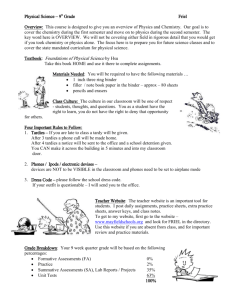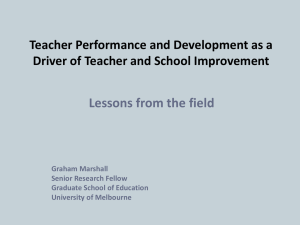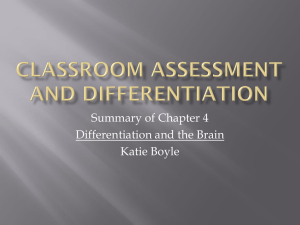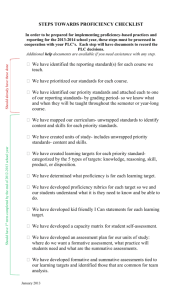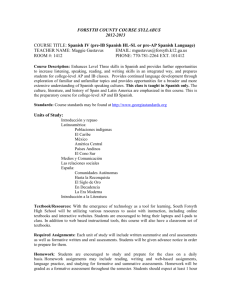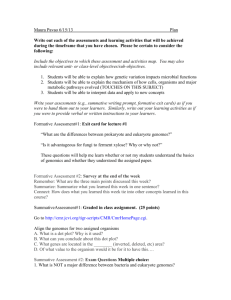Sip 2014 Linkages Chart
advertisement
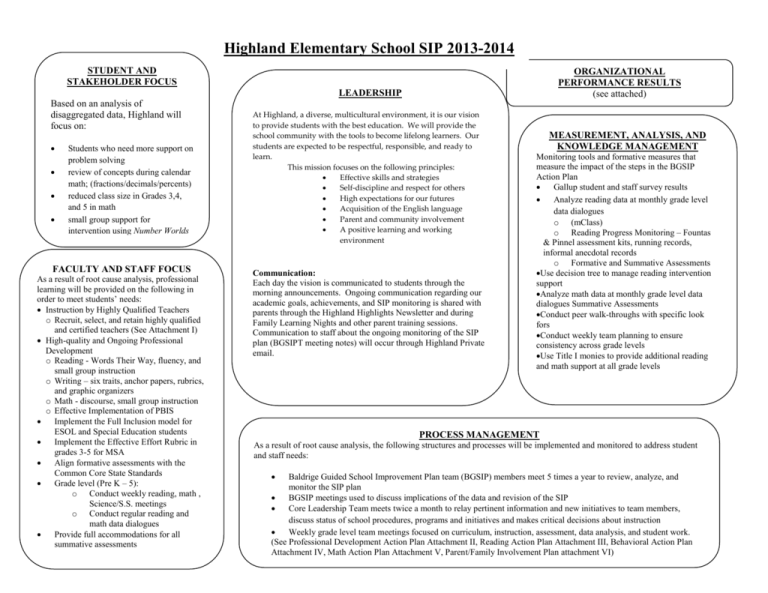
Highland Elementary School SIP 2013-2014 STUDENT AND STAKEHOLDER FOCUS ORGANIZATIONAL PERFORMANCE RESULTS (see attached) LEADERSHIP Based on an analysis of disaggregated data, Highland will focus on: Students who need more support on problem solving review of concepts during calendar math; (fractions/decimals/percents) reduced class size in Grades 3,4, and 5 in math small group support for intervention using Number Worlds FACULTY AND STAFF FOCUS As a result of root cause analysis, professional learning will be provided on the following in order to meet students’ needs: Instruction by Highly Qualified Teachers o Recruit, select, and retain highly qualified and certified teachers (See Attachment I) High-quality and Ongoing Professional Development o Reading - Words Their Way, fluency, and small group instruction o Writing – six traits, anchor papers, rubrics, and graphic organizers o Math - discourse, small group instruction o Effective Implementation of PBIS Implement the Full Inclusion model for ESOL and Special Education students Implement the Effective Effort Rubric in grades 3-5 for MSA Align formative assessments with the Common Core State Standards Grade level (Pre K – 5): o Conduct weekly reading, math , Science/S.S. meetings o Conduct regular reading and math data dialogues Provide full accommodations for all summative assessments At Highland, a diverse, multicultural environment, it is our vision to provide students with the best education. We will provide the school community with the tools to become lifelong learners. Our students are expected to be respectful, responsible, and ready to learn. This mission focuses on the following principles: Effective skills and strategies Self-discipline and respect for others High expectations for our futures Acquisition of the English language Parent and community involvement A positive learning and working environment Communication: Each day the vision is communicated to students through the morning announcements. Ongoing communication regarding our academic goals, achievements, and SIP monitoring is shared with parents through the Highland Highlights Newsletter and during Family Learning Nights and other parent training sessions. Communication to staff about the ongoing monitoring of the SIP plan (BGSIPT meeting notes) will occur through Highland Private email. MEASUREMENT, ANALYSIS, AND KNOWLEDGE MANAGEMENT Monitoring tools and formative measures that measure the impact of the steps in the BGSIP Action Plan Gallup student and staff survey results Analyze reading data at monthly grade level data dialogues o (mClass) o Reading Progress Monitoring – Fountas & Pinnel assessment kits, running records, informal anecdotal records o Formative and Summative Assessments Use decision tree to manage reading intervention support Analyze math data at monthly grade level data dialogues Summative Assessments Conduct peer walk-throughs with specific look fors Conduct weekly team planning to ensure consistency across grade levels Use Title I monies to provide additional reading and math support at all grade levels PROCESS MANAGEMENT As a result of root cause analysis, the following structures and processes will be implemented and monitored to address student and staff needs: Baldrige Guided School Improvement Plan team (BGSIP) members meet 5 times a year to review, analyze, and monitor the SIP plan BGSIP meetings used to discuss implications of the data and revision of the SIP Core Leadership Team meets twice a month to relay pertinent information and new initiatives to team members, discuss status of school procedures, programs and initiatives and makes critical decisions about instruction Weekly grade level team meetings focused on curriculum, instruction, assessment, data analysis, and student work. (See Professional Development Action Plan Attachment II, Reading Action Plan Attachment III, Behavioral Action Plan Attachment IV, Math Action Plan 1 Attachment V, Parent/Family Involvement Plan attachment VI) STRATEGIC PLANNING Measurable and Disaggregated Goals and Objectives To increase percentage of students who meet or exceed the 2014 Math AMO’s in the following subgroups: Hispanic, LEP, FARMS Analyze student data and provide individualized opportunities for students to increase reading proficiency as measured by m-class & Fountas & Pinnell assessments and MAP-R Analyze student data and provide individualized opportunities for students to increase math proficiency as measured by quarterly summative assessments and MAP-P and MAP-M School wide Reform Strategies: Implement Curriculum 2.0 in Kindergarten – Grade 5 focusing on Thinking and Academic Success Skills Provide opportunities to increase capacity for implementing small group reading instruction that meets the needs of all students Provide opportunities to increase teacher capacity in the area of writing instruction Provide opportunities to increase teacher capacity in the area of phonics and word study Provide opportunities to increase teacher capacity to implement math instruction that meets the needs of all students Strategies to increase parental involvement, such as family literary services: Provide opportunities to increase parent’s capacity for supporting the academic success of their children Involve parents as active participants in the planning, review, and evaluation of the School Improvement Plan Host family-friendly events and hold PTA meetings during the morning Plans for Transition from Early Childhood Program: Use of Kindergarten Toolkit Hold Kindergarten Orientation Provide literacy support through the literacy packets designed to provide students with practice skills to build literacy and fine motor skills Activities to ensure that under performing students reach proficient or advanced: Use of formative reading and math assessment monitoring system Use of Fundations program, Wilson Reading program, Words Their Way program, and Phonics Build-Up/Start-Up Kits strategies and materials to diagnose and improve phonics instruction for students Implement Number Worlds to support students not meeting proficiency standards on summatives Coordination and integration of Federal, State, and local services and programs, including programs supported under this Act: Title I, MCPS Budget, 21st Century, Head Start, MCPS School Improvement Budget 2 Performance Results 2010-2013 MSA All AfrAm Asian His White FARMS SPED LEP Reading ’11’12‘12 ‘13 89.7 87 85.7 93.1 91.2 100 94.7 100 92.9 88.2 84.1 100 100 92.5 88.9 85.9 79.5 88.6 89.5 91.1 87 83.3 ’10‘11 92.7 2014 AMO 90.0 1011 87.4 Math ’11‘12 90.6 89.3 78.6 86.2 ’12‘13 2014 AMO 90.6 78.2 83.9 82.4 96.6 94.4 94.7 95.8 88.2 89.9 87.9 90.7 90.9 75.2 95.3 100 94.9 100 85.2 86.3 88.8 89.7 76.3 84.6 59 76.7 69.2 57.9 87.5 86.3 89.3 89.7 74.3 3

